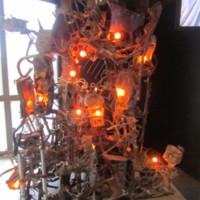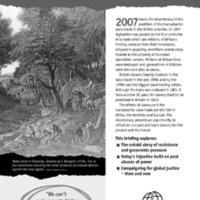
200 Years On: The legacies of enslavement and abolition
The World Development Movement seeks to increase awareness of political views in regards to world economic and social development. The organisation published a briefing in 2007 to mark the bicentenary, exploring the stories of grassroots pressure and the historic and modern campaigns for global justice. In collaboration with the University of Leeds, the World Development Movement also organised two public events looking to explore the lessons to be learned from the struggle to end the slave trade and examining contemporary campaigns in Africa and beyond for global social justice. Speakers included the Kenyan writer and academic Ngugi wa Thiong'o.
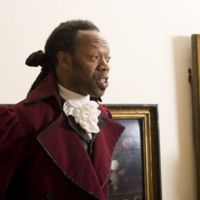
Breaking Chains - Sheffield Civil Rights
Breaking Chains - Sheffield Civil Rights was a project by Sheffield Galleries and Museum Trust to look at the slave trade and to celebrate Sheffield’s heritage by exploring the role local campaigners played in securing workers' rights. The resources targeted Key Stage 2 pupils. There was a particular focus on the visit to Sheffield by the African abolitionist Olaudah Equiano in 1790. Actor Joe Williams played Equiano in a dramatisation still available to view on the teaching resource. Featured here are some of the downloads available.
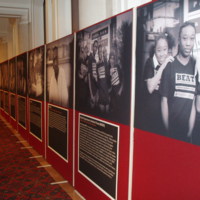
Freedom Roads
The Freedom Roads exhibition at Guildhall Art Gallery was one of several initiatives led by London Metropolitan Archives to mark the bicentenary. The exhibition featured contemporary photographic portraits of people of African origin whose work has contributed to the continuing struggle for human rights in different fields. Colin Prescod, Shirley Thompson, Eric and Jessica Huntley and Rudolph Walker were amongst the individuals featured. Others like the young people from BEAT (Black Experience Archive Trust) were engaged in a project to find out about significant people in their local community. Each person was photographed with an image of an object or place which has a special significance to them. The other part of the exhibition focused on relevant archival materials held by London Metropolitan Archives, including the South African Bill of Rights and a copy of the Constitution signed by Nelson Mandela, Cyril Ramaphosa, F. W. De Klerk and Roelf Meyer. Other material relating to slavery and abolition included a letter from John Julius, a plantation owner on the island of St. Kitts.
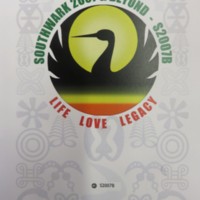
Southwark 2007 & Beyond (S2007B)
The Southwark 2007 & Beyond Steering Group was established to correct perceived misinformation about Britain's role in perpetuating slavery, and to promote education and dialogue on anti-slavery resistance and human rights. The Steering Committee was composed of representatives from Southwark's Afrikan, Afrikan Caribbean and Afro-descendant communities, and the year-long programme of events was funded by Southwark Council. August 2007 was a key month of the commemorative programme, focused on 23 August, the United Nations International Day for Remembrance of the Slave Trade and its Abolition, and the anniversary of the beginning of the Haitian Revolution. A 'Vigil of Remembrance, Resistance and Repairs' included speakers, performances and a libation ceremony. Other events included 'A Bicentennial Dialogue' featuring a keynote address by Dr Joy DeGruy-Leary. The publication 'Abeng Soundings: Abolitionist Landmarks of our Freedom March', co-authored by Esther Stanford of Rendezvous of Victory, provided an overview of the resistance efforts of African freedom fighters against slavery.
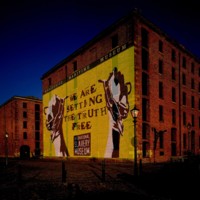
Opening of International Slavery Museum
Liverpool is a port city with a long association with transatlantic slavery. Located on Liverpool's Albert Dock, National Museums Liverpool opened the new International Slavery Museum in 2007, the first stage of a two-part development. The museum aims to promote the understanding of slavery and the transatlantic slave trade and the permanent impact the system has had on Africa, South America, the USA, the Caribbean and Western Europe. It features displays about West African society, the transatlantic slave trade and plantation life, but also addresses issues of freedom, identity, human rights, reparations, racial discrimination and cultural change. The museum also has strong ties with Liverpool’s large Black community. The museum opened on 23 August 2007, designated by UNESCO as Slavery Remembrance Day.
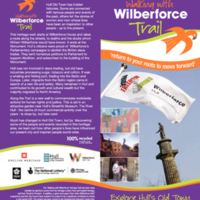
Walking with Wilberforce Heritage Trail
Part of Wilberforce 2007, the Walking with Wilberforce Heritage Trail is a journey through Hull's Old Town, via twelve important landmarks related to William Wilberforce and the theme of freedom. Along the trail is the Humanitarian Wall, at the Wilberforce Institute for the study of Slavery and Emancipation, constructed in 2006 to commemorate worldwide actions for human rights and justice. The ceramic markers, inspired by the Sankofa bird, were designed especially for the trail by three community and art groups from Hull's Africa Forum, from Hull College ceramic students and from local schools working in collaboration with two local ceramic artists. The trail was launched with a celebration of African culture led by students from Hull schools and the local Congolese community.
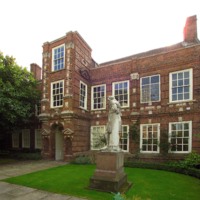
Wilberforce House Museum Re-opening
Wilberforce House Museum re-opened in 2007 after a significant redevelopment. In 1907 the 17th century building, and William Wilberforce’s birthplace and home in Hull’s Old Town, became Britain's first museum of the history of slavery. In 2007, the museum was fully refurbished with new displays. Some of these showcased existing collections, including those relating to the life of their famous patron, the slave trade and plantation life. Other displays engaged with themes considered absent from former interpretations, including the wider abolition movement. Another significant new feature was the inclusion of two galleries relating to modern slavery and human rights. These exhibits drew attention to local and global issues, with objects donated by members of the local community and contemporary antislavery campaign groups.
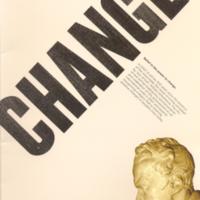
Wilberforce 2007
Wilberforce 2007 was a year-long programme of events from Hull City Council, commemorating the bicentenary and celebrating the city's diverse communities. The programme, named after 'son of Hull' William Wilberforce MP, was based around the themes of Pride, Freedom, Belief and Change. In partnership with Anti-Slavery International, Hull promoted the Fight for Freedom Petition against modern day slavery. The Wilberforce Lecture Trust held five specially commissioned lectures. The Wilberforce Weekender in July 2007 was a weekend of public events, including the Wilberforce Clipper Challenge Cup, Sankofa Sunsplash (celebrating African and Caribbean culture, food and music), Zapcat Racing, and the annual Jazz Festival. Throughout the year there were concerts and specially commissioned pieces from the Hull Choral Union, Hull Philharmonic, Hull Sinfonietta and the East Yorkshire Motor Services Brass Band. Other initiatives raised awareness of Fair Trade, and there was a variety of educational programmes and events. Funding was also made available for smaller community projects.
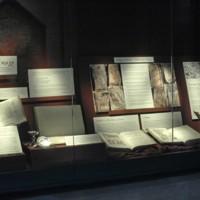
Distorted Image
Inspired by the bicentenary, the Distorted Image exhibition at Hereford Cathedral explored how distorted perceptions throughout history have resulted in prejudice, discrimination and enslavement. Incomplete or misleading images of human beings, who are black or female or in some way considered 'other', have resulted in unjust behaviour against them, particularly in the case of restricted legal and political rights. Alongside the example of slavery, this exhibition also looked at the invariably inferior position of women within church teaching. Distorted Image was part of the ongoing Mappa Mundi and Chained Library exhibition. The Hereford Mappa Mundi is a 13th century map featuring drawings of the history of humankind and the natural world, which records how medieval scholars interpreted the world in spiritual as well as geographical terms.

Woman to Go
One major trope in 19th-century antislavery visual culture was the auction block, which featured in the Liberator masthead from 1831 to 1865 as a scene with crowds of onlookers. In 21st-century antislavery imagery, the auction block is back. In 2010, the Task Force on Human Trafficking opened an installation called “Woman to Go,” featuring real women sitting or standing on blocks behind glass in a shopping center in Tel Aviv, each with a price tag and barcode.
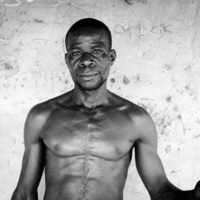
Slavery in Lake Volta
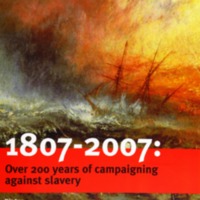
Anti-Slavery International, 2007
The world's oldest human rights organisation, Anti-Slavery International, led several initiatives in response to the bicentenary. The Fight for Freedom 1807-2007 Campaign, launched in 2005, called for measures to address the continuing legacies of the slave trade. The publication '1807-2007: Over 200 years of campaigning against slavery' looked back at the work of Anti-Slavery International and its predecessor organisations. The Spotlight on Slavery series of exhibitions and events included debates, lectures, film screenings and photography exhibitions. Anti-Slavery International also collaborated with a number of other organisations and projects in 2007, including Rendezvous of Victory and Set All Free, and contributed exhibition material to various exhibitions around the UK, including the Remembering Slavery exhibition at the Discovery Museum in Newcastle.
